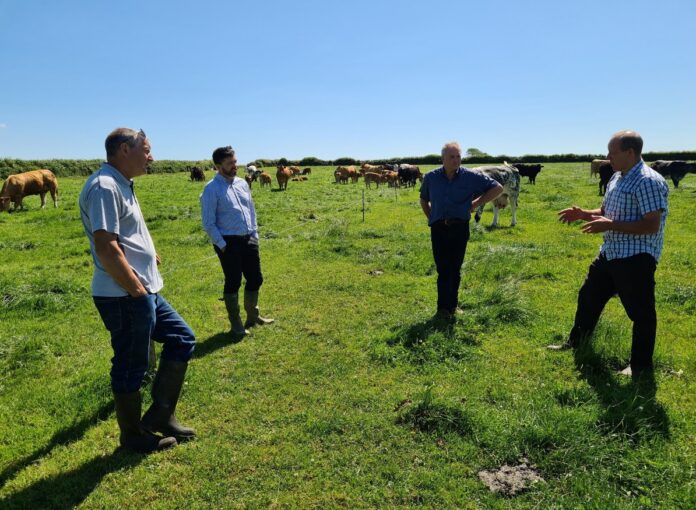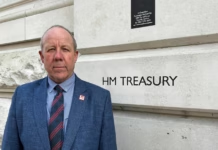Farmers from Pembrokeshire have put the spotlight on industry concerns around the free trade deal with Australia and climate change when they met with local MP Stephen Crabb. Hosting the visit was Farmers’ Union of Wales Pembrokeshire County Vice chairman Gerwyn Williams, who farms at Upper Swmbarch, Letterston near Haverfordwest.
The farm extends to approximately 94 acres, with the majority of the land rented from Pembrokeshire County Council, and 3.5 acres owned. Upper Swmbarch is home to a 50 Suckler cow herd, made up of Limousin and British Blue cows. The calves are reared with some sold as stores, some fattened and some kept as replacements. Gerwyn Williams keeps a closed herd and uses AI. Tack sheep are kept on the land in the winter. The land is mainly down to grass, but around 3 hectares of arable silage and 3 hectares of forage rape are grown each year to feed the livestock.
The farm has participated in the Glastir Small Grants scheme, which included planting new hedgerows in a number of locations across the farm and the holding has also previously participated in the Preseli ESA scheme, Tir Gofal and Glastir Entry.
Leading the discussions on the farm walk, Mr Williams said: “We are very concerned about the free trade deal with Australia. There will be major negative impacts for our farmers in Wales. It is absolutely essential that the UK Government ensures there are break clauses in the deal to allow for it to be reviewed. We need the UK Government to stand with the farming sector and help develop export opportunities for our farmers here at home.”
Union officials further highlighted concerns around beef prices and uncertainty within the industry as to what would happen as covid restrictions continue to be lifted and more people begin to eat out. Farmgate prices declined significantly during the early stages of the pandemic given the loss of demand from the UK foodservice sector for premium products such as steaks and cheese, and yet 12 months on, the sector is witnessing soaring lamb and beef prices following a shift in reliance on local food producers and UK sourcing.
“While the domestic foodservice sector is evidently an essential outlet for Welsh produce, it is equally a particularly price sensitive outlet through which large volumes of foreign imports are sold. The FUW is concerned that if trade policies allow for cheap food that undermines our world-leading standards to be imported into the UK, the foodservice sector could become an even larger outlet for such food given that the transparency and pressure to source domestic produce is not applied to the same extent as it is with retailers,” added Gerwyn Williams.
Mr Williams added that whilst the proportion of local produce procured by some public bodies has increased over recent years, there remain significant numbers of administrations which fail to support Welsh agriculture, choosing instead to accept produce from countries which often fail to meet the high production standards which are a requirement in Wales.
“The nature of some procurement contracts means that what appears to be a commitment to procuring Welsh and British produce within procurement rules can be circumvented by carefully worded clauses.
“The impact of Covid-19 on food supply chains in many parts of the world has served as a stark reminder of the dangers of relying on food imports. Domestic policies and trade deals which undermine sustainable food produced by family farms in Wales subsequently place food security, food standards and therefore farmgate prices at risk. Governments must recognise the sheer importance of maintaining and supporting food production, security and standards,” he said.
Addressing concerns around climate change, Union officials discussed how targets are set by the Government and how the UK and Welsh industry is portrayed negatively in the climate change debate. FUW Deputy President Ian Rickman said: “Many of the facts and figures used in the conversation around climate change relate to non-UK systems of production.
“Here in Pembrokeshire ,and across Wales, farmers are adopting climate friendly systems of producing food and looking after the land for example through minimal or no till cropping, grass based production systems, planting of hedgerows, and habitat management. We can’t just get rid of the livestock, or drastically reduce it. Livestock play an essential role in looking after the land. Many habitats have to be grazed in order for them to flourish.
“Our dairy industry is also doing their bit and many dairy farmers are already undertaking carbon footprint calculations and producing nutrient and biodiversity plans as part of their milk contracts. Farming must be seen as the solution to the climate problem and not its root cause.”
Given the many obstacles farmers now face, including the NVZ regulations and bovine TB, Union officials further stressed that recruiting young people into the agriculture sector and sourcing labour was becoming increasingly difficult.
FUW Pembrokeshire County Chairman Mike Kurtz added: “Recruitment seems to be a common problem in relation to vocational occupations that needs to be addressed.
“I would like to thank Stephen Crabb for meeting with us again and discussing so many issues that trouble the industry. We will continue to work with the UK and Welsh Government to ensure we have thriving, sustainable family farms here in Wales for generations to come.”

| [donate]
| Help keep news FREE for our readersSupporting your local community newspaper/online news outlet is crucial now more than ever. If you believe in independent journalism,then consider making a valuable contribution by making a one-time or monthly donation. We operate in rural areas where providing unbiased news can be challenging. |


















